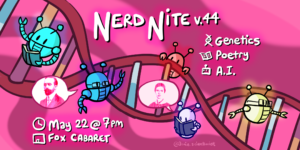May 22nd is National Goth Day. The Goths’ reputation as barbarians is mostly fake news that got told from the perspective of the ego-torn Romans who got their ass handed to them in 410 CE. For the most part Goths were peaceful hunters and farmers who were very sophisticated when it came to trade, diplomacy, and agriculture. It’s no wonder that these outcasts would become the inspiration for your Gr.9 self, when perhaps you first heard the dulcet tones of Robert Smith tell you that it was okay for boys to cry, practiced your spastic Ian Curtis dance moves in the mirror, and wore eyeliner just like Siouxie. So pull your black leathers and lace and get in here for the 44th version of Nerd Nite, where we have three amazing nerds to talk about genetics, poetry, and artificial intelligence!
Hosted by: Kaylee Byers and Michael Unger
DJ Bürger – Grant Francis Minor
Poster: Armin Mortazavi
IG: @armin.scientoonist
When: Wednesday May 22nd; Doors @ 7, show starts @ 7:30

1. Can Artificial Intelligence Learn Chemistry/Physics?
Rodrigo A. Vargas–Hernández
Machine learning (ML) algorithms are used extensively in daily tasks such as language translation, image recognition, and navigation systems to mention a few. In this talk, I will explore how the fields of chemistry and physics have benefited from the use of ML algorithms. ML is divided into three main fields, (i) supervised learning, (ii) unsupervised learning and (iii) reinforcement learning. During the talk, I will explain how one can reformulate some chemistry/physics problems in terms of each field of ML. The results I will present illustrate how ML can help us predict material properties, similarities between chemicals and new synthetic routes, and the synthesis of chemical compounds without human intervention using robots and computers.
2. Poetry is Fucking Fun
Dina Del Bucchia
The worst part of being a poet, and being someone who enjoys poetry, is all the jerks who say they aren’t interested in poetry, don’t read poetry, just don’t get poetry. What everyone who limits their exposure to poetry is doing to themselves is making sure they’re having a less good time. In fact, poetry is very similar to actual popular art forms. Performed on stage poetry can be as hilarious and engaging as a night at a comedy club. On the page it has the capacity to go deep on subjects normally reserved for op-eds. Or to talk about human emotions we see reflected on TV and film. The musicality of a hit song is present in poetry’s rhythm and meter. See? It’s really not so different from other pop culture. Converting people into poetry readers is the only conversion therapy I support.
Bio: Dina Del Bucchia is an otter and dress enthusiast originally from the village of Fruitvale, BC. She is the author of the short story collection, Don’t Tell Me What to Do, and four collections of poetry: Coping with Emotions and Otters, Blind Items, Rom Com, written with Daniel Zomparelli, and the newly released, It’s a Big Deal! She is a senior editor of Poetry Is Dead magazine, the Artistic Director of the Real Vancouver Writers’ Series and hosts the pretty literary podcast, Can’t Lit, with Jen Sookfong Lee. You can find out more about her at: dinadelbucchia.com.
3. Genetics
Avery Noonan
From new ideas to recounting history, language enables us to externalize our thoughts and share our ideas with the world. With the familiar characters “ATCG” and the resemblance of a code with rules and syntax, it is easy to think of our DNA as the language of life. However, instead of being used to communicate our ideas and thoughts, the language of DNA encodes our biological past, present, and future. In an era where you can order a kit online to sequence parts of your genome and synthesize a gene for the price of a taxi home to the suburbs, reading and writing the language of life has become a common practice in medicine, agriculture, manufacturing, environmental monitoring and the study of the natural world. However, unlike the language you speak with your friends, humanity didn’t invent DNA to represent our own thoughts, and we are still working on understanding its intricacies. Much like copying out the characters of a language you don’t speak, context is everything and meaning is often lost in translation. We are going to explore the extent to which we can read and write the genetic code, and the challenges of speaking a language we are only beginning to understand.
Bio: Avery Noonan is a Toronto-born, BC-raised graduate student at the University of British Columbia. He is interested in biking, hipster cocktail bars, beach volleyball, hip hop and the engineering of microbial metabolisms to build, breakdown and detect material in an environmentally sustainable way, and the development of genetic tools for these purposes.
